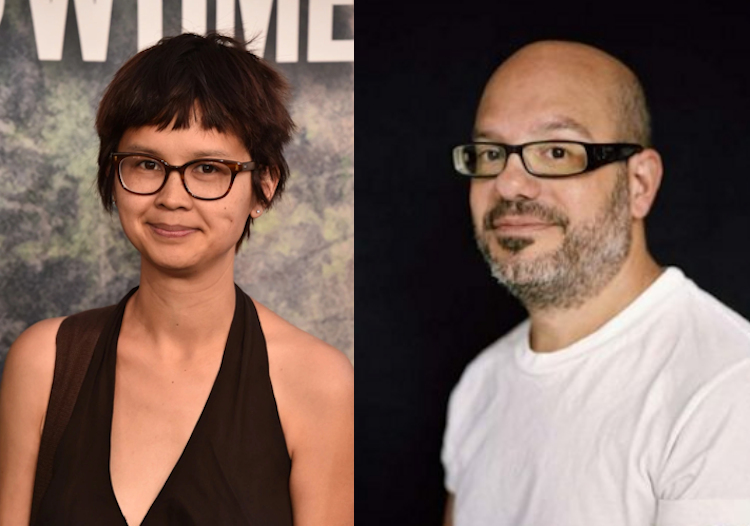
This story was updated on October 17, 2017, October 18, 2017, and October 20, 2017 with new developments. Please scroll to the bottom for updates.
Charlyne Yi — the award-winning actor, comedian, writer, and musician best known for her role as a series regular on House, her voice acting work on Steven Universe, and her starring role in Paper Heart which she also wrote — took to Twitter earlier this week to describe her first encounter with writer, director and actor David Cross.
In a series of four tweets, Yi — who is mixed race Filipinx and Korean American — describes how when she first met Cross, Cross made fun of Yi for her appearance. When she didn’t respond, Cross reportedly said: “What’s a matter? You don’t speak English?? Ching-Chong-Ching-Chong.” Cross went on to mockingly challenge Yi to a karate match.
At the time of the encounter, Cross was over forty years old, and already an established comedian, writer and TV and film actor with several stand-up comedy specials already under his belt. Yi was a veritable newcomer to the comedy and acting scene, and was only about twenty years old.
https://twitter.com/charlyne_yi/status/919815303357374464
https://twitter.com/charlyne_yi/status/919815401902444544
https://twitter.com/charlyne_yi/status/919818045975019521
https://twitter.com/charlyne_yi/status/919818218515992576
Cross, who is known for his left-wing political satire, describes himself as a “socialist Democrat” who has previously criticized comedian Larry the Cable Guy for being racist and anti-gay. It seems, however, that Cross himself isn’t immune to being racist: mocking an Asian American woman with “ching-chong-ching-chong” is textbook anti-Asian racism.
Moreover, the privileged entitlement that Cross employed as an industry staple to get away with this racist mockery of a newcomer is clear. Whether with regard to workplace racism or sexual harassment, the ways that people with power leverage their professional positions to intimidate, bully, and silence victims from speaking out against abuse remain the same. For women of colour, the line between racial and sexual harassment are further blurred: many professional women of colour in STEM, for example, recount how the sexual harassment and gender discrimination they fact in the workplace is often highly racialized, and vice versa.
This week’s national conversation around #metoo is not just about highlighting sexual assault; it is about demonstrating the many ways that harassers and abusers are institutionally protected from facing consequences for the abuse they enact. According to Yi, Cross subjected her to racist abuse at their first encounter, and this was so mundane an exchange for him that he had completely forgotten about it by the time of their second encounter. Notably, at that second conversation, Cross treated Yi with the sort of basic respect one expects when being introduced to a peer: perhaps because, by then, Yi was more professionally established? Did he perceive less of a power imbalance between them that he could exploit?
In 2015, the US Equal Employment Opportunity Commission (EEOC) received nearly 30,000 complaints related to workplace harassment and discrimination. The EEOC further noted that this is likely a massive underestimate of the prevalence of workplace discrimination — which includes racial, sexual and other forms of harassment; the vast majority of harassment incidents likely do not result in a formal report to the EEOC. Nonetheless, the EEOC also noted that in 2015, 43% of all complaints filed to the Commission by federal employees that year were related to workplace discrimination and harassment.
Of the nearly 30,000 complaints the EEOC received in 2015 related to workplace discrimination, 45% were related to charges of discrimination based on race and 34% were related to charges of discrimination based on sex; again, some complaints alleged both. The EEOC further notes that prevalence of race- or ethnicity-based discrimination in the workplace is seriously understudied, but that some studies estimate that between 40-60% of employees of colour experience some form of race- or ethnicity-based harassment at work.
There is no excuse for the continued culture of workplace harassment that people of colour must endure on a daily basis. What should be more frustrating about Yi’s story isn’t just that it happened, but also that people like David Cross typically face zero consequences for exercising his privilege and power to victimize an up-and-coming industry newcomer.
As Asian Americans, we talk a lot about wanting to diversify Hollywood and other industries. But, getting actors of colour to the casting couch is not enough; we must also stridently oppose the culture of entitlement, abuse, and exploitation that are endemic to most industries wherein people of colour and femmes are traditionally underrepresented, and that challenge our ability to navigate and succeed in those spaces.
David Cross was a cavalierly racist asshole ten years ago, and literally nothing happened to him. That is not okay.
Update: David Cross has responded on Twitter with basically whatever the polar opposite of #IBelieveYou is. This is neither how an apology nor how contrition works.
Adressing the Charlyne Yi tweet below. pic.twitter.com/WMHxH6lZco
— david cross? (@davidcrosss) October 18, 2017
Here is his tweet responding directly to Yi, where he also misspells her name to boot:
Charlene, i dont remember this at all! It's bonkers to me and WAY, way out of character. DM me so I can understand all of this.
— david cross? (@davidcrosss) October 17, 2017
Yi has yet to respond to the-… I don’t really know what to call it, but “apology” is definitely not the right word.
Please do better, Mr. Cross. Do better.
Update (10/18/2017): Cross has taken once again to Twitter to offer a second version of the events that transpired when he first met Yi. In a two-part tweet, Cross suggests that perhaps he did use “ching-chong-ching-chong” when greeting Yi, but as part of him doing a “asshole racist redneck” character.
In other words, Cross suggests that he would never use the racist phrase “ching-chong-ching-chong”, unless he was playing a racist; and also that it’s not his fault that Yi didn’t understand that he was being satirically racist. Because, as we all know, satire is the white liberal go-to defense for hate.
— david cross? (@davidcrosss) October 18, 2017
— david cross? (@davidcrosss) October 18, 2017
This latest effort is honestly not even a fraction better than gaslighting Yi with a note that ends with the tag, #Rashomon.
Let’s just start with this: since when does using a racist phrase to greet a person you are meeting for the first time become socially acceptable just because you think you’re pretending to be a racist for funsies?
Please do better, Mr. Cross. Do better.
Update (October 20, 2017): Cross’ wife, actor Amber Tamblyn (The Sisterhood of the Traveling Pants) — who recently penned an editorial about Hollywood sexual harassment critiquing the many ways in which a survivor’s credibility is questioned after they come forward with stories of abuse — has said that she believes Charlyne Yi.
Tamblyn had been critiqued for writing the editorial in defense of survivors of sexual harassment, and then appearing to defend Cross who deployed gaslighting tactics against Yi.
In a series of three tweets, Tamblyn said she had reached out to Yi, and that the two had spoken about the incident. Tamblyn went on to say that she believes Yi’s account of the events that transpired ten years ago. Tamblyn also pointed that women should not be held accountable for the actions of their partners.
I spoke to @charlyne_yi and her feelings/safety are all that matter to me. We’re good. I owe you nothing, Twitter. You’re lucky to have me.
— Amber Tamblyn (@ambertamblyn) October 20, 2017
I’ll say it again. I spoke to Charlyne. I believe her. I’m about HER feelings/emotional health right now, not Twitter’s. That okay with you? https://t.co/aQU5dGqKuY
— Amber Tamblyn (@ambertamblyn) October 20, 2017
I will say this for the last time. Do not hold women accountable for the actions, decisions or words of their partners. Don’t. Do it.
— Amber Tamblyn (@ambertamblyn) October 20, 2017
Hours after tweeting these messages, Tamblyn said she would be logging off Twitter for awhile.
Twitter, you giveth and taketh and so for a while, I leaveth.
See you you soon, you crazy, complex confluence of passion.
— Amber Tamblyn (@ambertamblyn) October 20, 2017


